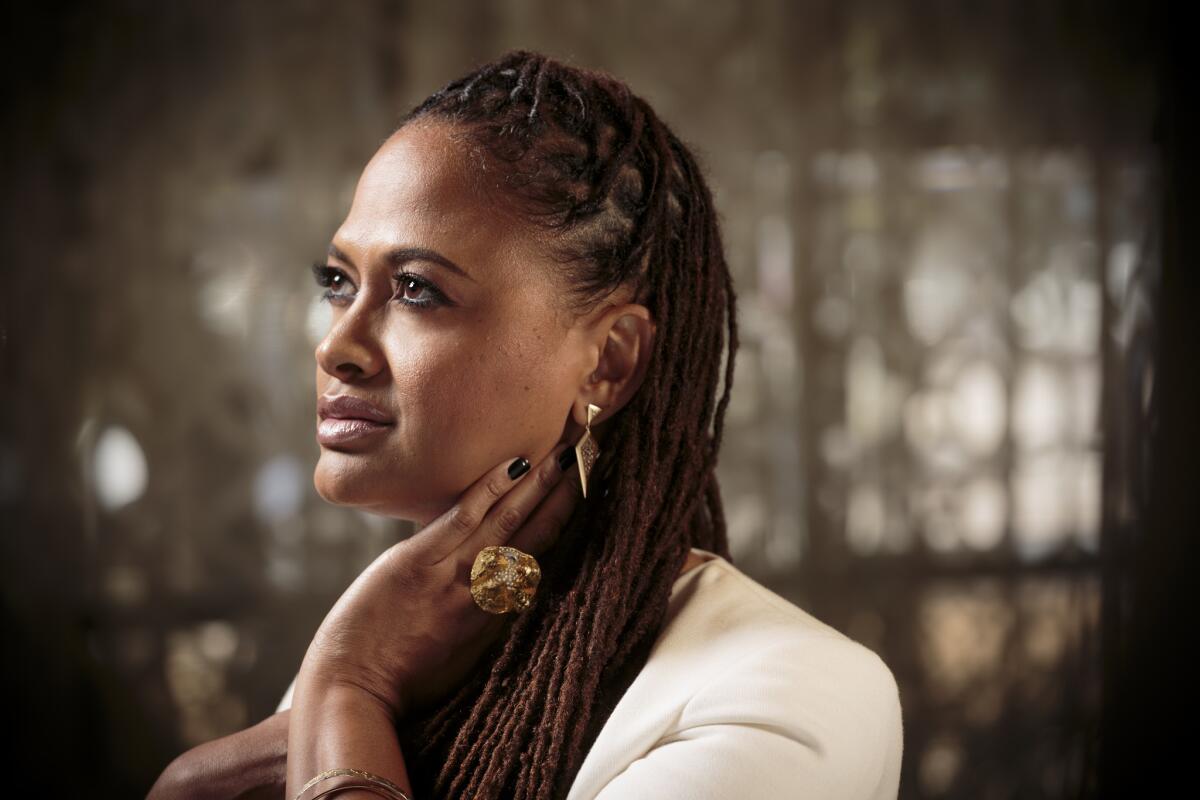Ava DuVernay tackles mass incarceration in ‘13th’

When most people think of the 13th Amendment to the U.S. Constitution, words like “freedom,” “liberation” and “emancipation” come to mind. But director Ava DuVernay thinks, “incomplete.”
That’s because while the 13th Amendment outlawed slavery, it legalized a form of bondage for those convicted of crimes. It reads: “Neither slavery nor involuntary servitude, except as a punishment for crime whereof the party shall have been duly convicted, shall exist within the United States, or any place subject to their jurisdiction.”
Effectively, it’s slavery by another name, DuVernay said. And 150 years later, the United States has the highest rate of incarceration of any country in the world, and a multibillion-dollar industry has been created based on the criminalization of primarily black and brown people. Her latest project, the documentary “13th,” which opens in theaters and releases on Netflix on Oct. 7, explores this phenomenon: How modern-day prison overpopulation has its roots in the Constitution.
“It’s providing connective tissue between pieces of our history and pieces of our present moment,” she said about the documentary. “We’re aware of it, but something happens when you put it all together in a line. You see how it’s a domino effect.”
The idea for “13th,” which takes its name from the amendment, came shortly after the promotional tour for “Selma” in 2014. Though the Martin Luther King Jr. biopic was highly acclaimed, very few offers came her way. Of those that did, only Lisa Nishimura, Netflix’s vice president of original documentary and comedy, allowed her the freedom to create whatever she wanted. (And Oprah Winfrey, who gave DuVernay the space to create “Queen Sugar” for the Oprah Winfrey Network.)
Hopefully, with this you get to go a little bit deeper into the things we feel as Americans about who’s the criminal.
— Ava DuVernay
When prompted by Nishimura, on DuVernay’s mind was “trying to give context to the past while talking about the present,” as she did for months connecting “Selma” to recent #BlackLivesMatter protests. She decided to focus on mass incarceration. Netflix, she said, “gave me every resource and the time to do it. There was no deadline.” The resulting film is a “reverse engineering of some of the things we talk about in ‘Selma.’
“This is taking the long-tail approach, telling the same story in a bit of a different way,” she said.
Through a collection of interviews, archival footage and hand-drawn illustrations and graphics, “13th” attempts to break down the root causes of the current mass incarceration problem. Interviewed in the film are political commentator Van Jones, “The New Jim Crow” author Michelle Alexander, writer and professor Jelani Cobb and historian Henry Louis Gates Jr., along with Angela Davis, Sen. Cory Booker (D-N.J.), conservative Grover Norquist, former presidential candidate Newt Gingrich and Black Lives Matter activist and Cal State L.A. professor Melina Abdullah.
For Jones, known for his passionate commentary on CNN, when he thinks of the 13th Amendment, the words “freedom, deferred” come to mind.
“Because, on the one hand, we were no longer enslaved, but because of the loophole that says you can be forced to work if you are convicted, slavery was reintroduced in the same moment it was eliminated,” he said.
And the legacy of such an amendment is inextricably tied to “an $80-billion-a-year industry around locking up human beings,” he added.
The system of incarceration used in the United States is a problem, the documentary asserts, for a number of reasons including it being based on hurting people, as opposed to restoring them, and the obvious racial bias that has communities of color, when compared to their white counterparts, overly policed, charged, prosecuted and sentenced. Therein lies the very reason why Jones found it necessary to connect the current conversation about mass incarceration to slavery and the 13th Amendment, as “13th” does.
“It’s important for people to have an understanding that this tendency on the part of America to put black bodies in chains has a very long history,” he said. “It’s important to have that context because otherwise one might make the mistake of thinking the reason [black people] are in jails is because a lot of them are criminals. But they’re overlooking the fact that a lot of white folks are criminals too — but they’re not in jail.”
Malkia Cyril, executive director of the Oakland-based Center for Media Justice and a Black Lives Matter leader who is also interviewed in “13th,” added: “If you don’t look at [incarceration] historically, you allow it to morph from one face to another face. But it’s still the same beast [as slavery], and you end up having policy changes that maintain the status quo rather than transforming it.”
The documentary comes at a time when the Black Lives Matter movement has received plenty of media attention for demonstrations against police brutality. Cyril says it’s important to understand that although excessive force by police may have been the spark of the movement, its interest is in something greater than just police.
“Black Lives Matter is fighting ultimately for a world that is not founded on the carceral state with policies not driven by the need to socially control black people for a nation to grow and produce,” she said.
DuVernay hopes the film will help people challenge some of their preconceived notions about race and incarceration in America, a process she had to go through in making the picture. Though she initially thought Republicans were the reason so many people are imprisoned, tracing policies to the administrations of Richard Nixon, Ronald Reagan, George H.W. Bush and Bill Clinton revealed to her the bipartisan effort behind what is now known as the prison-industrial complex.
“I am telling this story through what I learned as a storyteller,” she said. “Hopefully, with this you get to go a little bit deeper into the things we feel as Americans about who’s the criminal.”
Get your life! Follow me on Twitter: @TrevellAnderson.
ALSO
How Alexis Arquette and the Lady Chablis paved the way for Hollywood’s transgender moment
More to Read
Only good movies
Get the Indie Focus newsletter, Mark Olsen's weekly guide to the world of cinema.
You may occasionally receive promotional content from the Los Angeles Times.








